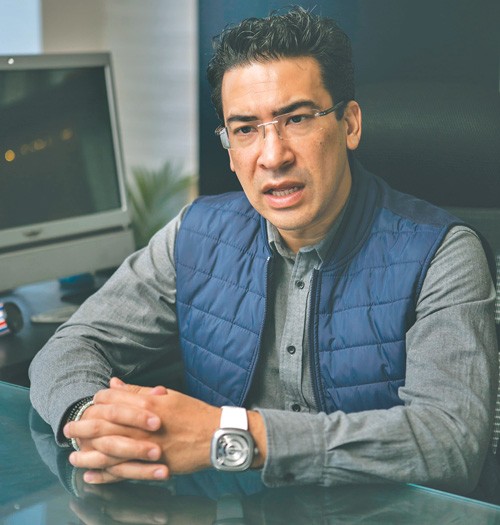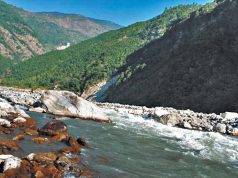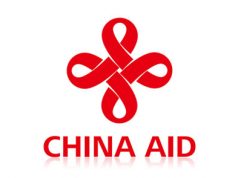Until and unless you actually visualise and see something, it is not possible to achieve your goals and targets
Kathmandu, December 5, 2016: Having joined his family business after completing his studies from BMS College in Bangalore, Saurabh Jyoti has been involved in Nepal’s corporate sector for the past fifteen years. Initially starting out with the marketing department at Himal Iron and Steels, Jyoti is now a member of the board of directors at the Jyoti Group and is the chairman at Syakar Trading Company—the authorised distributor of Honda cars and bikes in the country.
In this interview with Alisha Sijapati, Jyoti talks about the working culture at his company and his leadership and management mantras. Excerpts:
Can you tell us about the working culture at Syakar?
Syakar is the market leader when it comes to two-wheelers and power products; and in cars we come at number seven. The company has been doing business for over 48 years now, and we have over 400 employees. We are taking in a lot of new manpower and new services because customer satisfaction is our priority. We are focusing not just on the latest products but also delivering after sales service, mobile service, call centres and various other campaigns. Syakar is heavily involved in social engagement in a lot of ways in order to retain customers and give them the best services not only during sales but after it as well. Within the working culture, we have various specific departments; each department has its own expertise. We have weekly meetings and updates with each department whether it be services, engineering or media—we are clear on what we want to achieve. Syakar promotes teamwork and we engage and promote our staff to work together. Retaining and satisfying our customers with our sales or after sales services is our utmost priority.
After sales services have become the selling points for automobile companies in the country. Why is this form of customer service important?
After sales services have become very important in the marketplace today. It is also a great opportunity for companies to create brand loyalty. There is a tremendous demand for workshops and to cater to that demand, we have training programmes for local mechanics and we give them training as per the Honda standard. Not just at Syakar, but almost all companies have adopted the same model and it is likely to only grow in the future.
When tackling such a large workforce, it is natural for labour issues to arise. How does Syakar address them?
This is a third-generation business and we treat our employees like our extended family. In our company, we have a lot of working committees and we sit together to address issues regularly. We don’t wait for problems to arise before trying to solve them. We meet on a quarterly basis as a rule, or even monthly sometimes. At these meetings, we sit together and talk and try to resolve any issues, or future issues, there and then and not wait for the problem to fester. There is no strategy here, this is how we work. We openly discuss at all levels, from labourers to the top management. It avoids 80 percent of the problem.
HR has not been given much importance in Nepal’s corporate sector. What’s your take on that?
HR is very crucial, and we have a core department dedicated to it. The department keeps head hunting for new people so we can get new, talented people into the company. And naturally, a lot of people are leaving and coming.
The way I see it, we have two types of employees—those who have been working with us for very long time and the new staff, who tend to have a high turnover rate. People come, work, leave and we too are expanding and need new people—and HR plays a crucial role in that. Although, HR was not given much importance before, currently it is important for any company to add this department.
As you said, there are long-standing employees and those who are fresh in the company. How does Syakar balance between the two?
20 percent of our staff has been working with us for a while. More than 70 percent of employees working here are young and newly hired. And slowly, many of the responsibilities are being handed down to the younger generation. The youth are energetic, vibrant and enthusiastic whereas, the older staff are taking things a bit slowly. But having experienced staff is also important as they understand the company and the working culture. They are trustworthy and loyal. New hires are more energetic, efficient, tech savvy and have new energy. We have found that striking a good balance is beneficial for both set of employees.
What would you say is your leadership style?
I am not very intrusive. I have certain goals that I want each company to achieve. Of course, the mission and the vision of the company is very important including our working culture, ethics and values. I just monitor what the employees are doing and let them take the lead. Our company has open communication from employees to the top management. We make sure that conversations are transparent and crystal clear. Also, my doors are always open for communication. Our hierarchy is not a vertical structure; we follow the horizontal structure, which has a lot of benefits.
What are your management mantras?
I don’t have anything complicated. Seeing is something that is very powerful. People talk about a lot of things in Nepal but until and unless you actually visualise and see something, it is not possible to achieve your goals and targets. I believe that I am a very practical person. So, my mantra will be SEE—Simplify, Economise and Execute. One needs to simplify things, work effectively and of course, execute your plans.
What advice do you have for fresh graduates wanting to join the auto industry?
I think the auto industry is moving in a very fast pace right now. A lot of new technologies are coming up. It’s a very exciting phase because the industry is undergoing a major transition currently. So naturally, there are lots of opportunities for young, enthusiastic professionals in the sector. Nepal’s auto industry has a tremendous potential and is a great place to develop your career.







